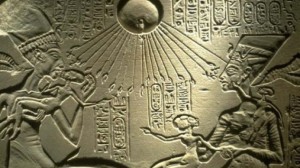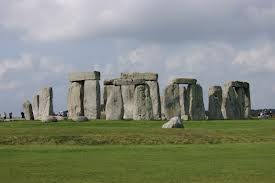Religion is one of the most prevalent and influential aspects of human civilization and culture, yet the origins of religion remains shrouded in mystery to most people. Nearly all societies across the globe in every recorded era have some sort of religion, worship a god (or gods), or possess a set of religious beliefs. But… why?
People pour a great deal of time and energy into their religion with some willingly giving their life in the name of their sacred religion. However, while nearly all groups of people have invented gods and the religious stories revolving around their gods, perhaps the most striking feature of religion is that these stories are wildly different.
Consider the differing religious gods, stories, and teachings of the Norse, Greek, Roman, Persians, Hindus, Egyptians, Aztecs, Babylonians, Chinese, Indians, Christians, and Jews – to name a few of the thousands of religions and gods known through history. These religions and gods have a few similarities, such as creation stories and stories about what happens after death, but their particulars are all very different. So which religion is right, if any? And how did these stories and gods come into existence? A systematic inquiry into the evolutionary origins of religion can elucidate some understanding to those questions – and many others – regarding religion.
The Origins of Religion

Religion is a worldview and can be described as a set of beliefs about the causes, nature, and purpose of the universe. Since human beings, and to a lesser extent all other animals, navigate the world by developing a set of cause and effect it would have been important for our ancestors to develop a sense of understanding about how our world worked. Animals develop their sense of cause and effect in order to carry out tasks essential to their lives, such as where to find food, how to get mates, and how to avoid danger. With the evolution of human intellect – the ability to have abstract ideas, to communicate those ideas through language, and to remember things from the past – people are able to perceive more about the world than other animals and therefore have a greater sense of cause and effect. This also meant we could ask more questions and attempt to answer them the best that we could given our knowledge and understanding of the world.

The primitive world of our ancestors was filled with dangers and its workings would have seemed confusing. Cooperating with nature by knowing how certain things worked would have seemed vital to our survival.
For instance, understanding why the Sun moved and how and why the seasons changed would have been important; understanding the weather would have been important; understanding why people got sick and diseased would have been important; understanding what caused the plants to grow and the animals to move would have been important, but how do you explain all of that? Before the laws of motion and gravity were established; before plate tectonics and atmospheric and oceanic physics were explained; before microscopic germs, viruses, and bacteria were discovered; before the laws of thermodynamics, the process of photosynthesis and metabolic pathways were described; people had no clue as to the correct answers. But people still needed answers to complete their sense of cause and effect so they could begin to understand how the world worked in an attempt to cooperate with it.
Cause and Effect in Practice
To take one example: noticing that the seasons change is important because when that happens we notice that some animals migrate at certain times of the year, plants grow and die at certain times of the year, and the temperature changes at certain times of the year. When we draw connections between one thing and a second thing in the world – such as animals migrating when winter comes – we are creating relationships that complete our sense of cause and effect. We can now better predict the effects of our actions on the world. With human intellect, however, humans differ from other animals in that we not only notice that the seasons change, we can ask *why* the season changes.
Due to the relationship nature of causes and effects, it’s possible that knowing more about the first thing might help us understand more about the second thing. So understanding why the seasons change might keep us from staving or freezing by helping us to better predict when the seasons will change. People all over the world noticed these things and tried to answer the questions the best they could and they did it in the same basic manner – by invoking gods and spirits as causes to these unexplainable actions and events. Thus in a prescientific world, the invention of religion with an accompanying set of beliefs about how the world works helped to complete a cause and effect understanding of the world for early human societies. Next, we’ll incorporate the role of the supernatural and spirituality into the origin of religion.
Further reading: The Dominate Animal by Paul and Anne Ehrlich; The Demon-Haunted World by Carl Sagan; The Magic of Reality by Richard Dawkins; Breaking the Spell by Daniel Dennett
Interesting read. I never thought about cause and effect perspective. I find religion to be fascinating!
Wow this is interesting I really love this story.. It speak about the happening things in Christian churches today
This article is really interesting, I just realized about the cause and the effect for societies. Thanks for sharing!
Totally agreed with your definition of religion. Captivating read and I appreciate the brief history to give some background knowledge to those who might not have it.
Such one of the great article about cause and effect perspective. We have different beliefs about religion but for me always have respect and have a faith is one of the main key these days 🙂
Glad to have read and known something new. I appreciate you sharing this.
This was interesting read and lot of new information. Thank you for sharing x
Laura
https://pinkfrenzymissl.blogspot.com/
This is a really interesting take on how religion came to be. I completely agree with your post BTW.
Interesting information, I have always believed in religion’s cause and effect, thanks for sharing.
Religion is such a vast topic and I enjoyed reading your post! I believe that religion is someone’s personal faith and I’m nobody to comment on that!
Intresting read. I love how you grounded it with facts. Religion can be both an intresting and tricky topic to talk about.
I find what you have to say interesting, although not a complete picture of religion and how it came to be. It’s not the fact that most religions have creation stories which make the similarities interesting. It’s that most religions have a great flood or a massive catastrophic event which I find unique. Why would that be the case in religion? Finally, one could almost say, given your definition of religion, it pretty much comes down to pre-science. It’s a way to impose order on a world to help us make sense of it . . . which is all science really is anyway. The only difference is science argues for natural means precluding the possibility of the supernatural, while religion explains the world in concurrently natural and supernatural means, arguing some supernatural entity imposed natural, rational order on the world, making it understandable. It all comes down to faith. Do you have faith that order came from chaos, or that order came from order? I’ll take order from order.
This is a great explanation of why religion was *invented*. Knowing this can help bring many great clarity!
This is an interesting read. So many things that I didn’t know until reading this. Thank you for the information.